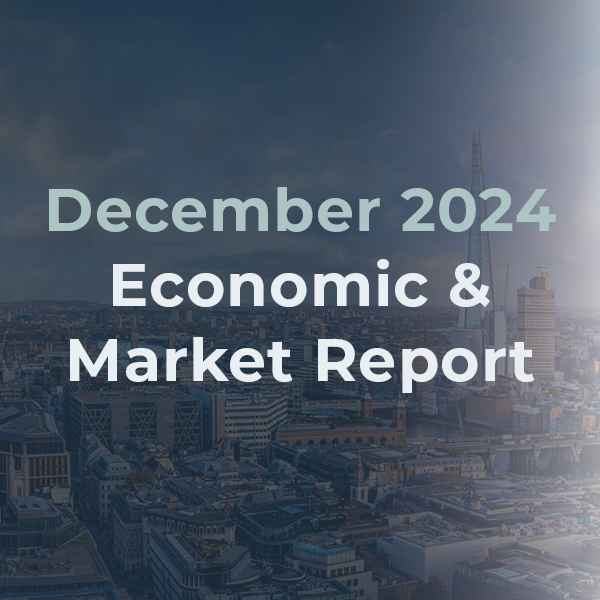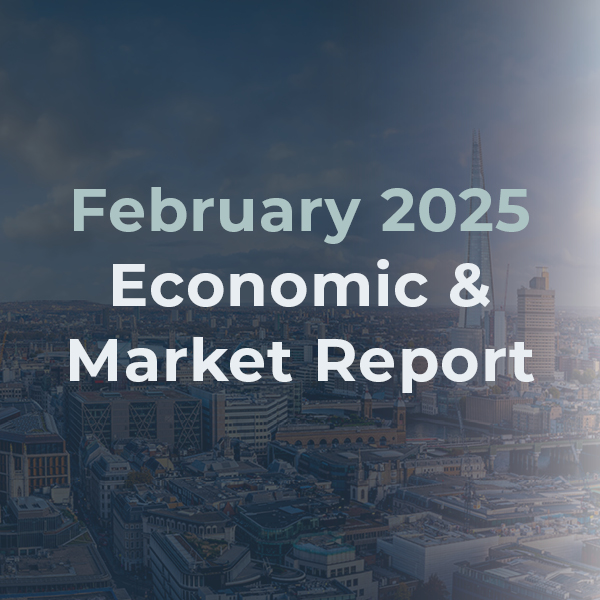Market Insight
December 2024 Economic and Market Report
This Article was Written by: Ben Jones - Fundhouse
Economic & Market Report, Market Report
Economic commentary
In December, we learned that consumer prices in the UK rose by 2.6% in the 12 months to November, up from 2.3% in October. The Bank of England’s Monetary Policy Committee voted to keep rates unchanged at 4.75% during its December meeting. This was perhaps not a big surprise – inflation is still stubbornly (although modestly) above the Bank’s 2% target, and some market participants expect that the government’s 2024 Autumn Budget measures are already feeding through into higher prices. Whilst they want to keep rates low to support borrowers, the Bank does not want to stoke higher inflation.
The US Federal Reserve (the Fed) cut interest rates by 0.25% before Christmas, bringing interest rates down to a range of 4.25% to 4.5%. Stable inflation and stronger-than-expected economic and jobs data in the US has led to expectations of fewer US interest rate cuts needed in 2025, with the Fed suggesting as much themselves. The European Central Bank also lowered interest rates by 0.25% this month; their main deposit rate now stands at 3%. This rate cut was done as a response to the eurozone economy being dragged down by political instability along with the threat of a fresh U.S. trade war. The three largest economies— Germany, France, and Italy —saw declines in business activity in December.
China surprised markets by announcing it would adopt a more relaxed monetary policy in 2025 to boost growth, suggesting stimulus levels not seen for years. Political uncertainty dominated South Korea after (now suspended) President Yoon Suk Yeol declared martial law, leading to a political crisis and protests. The situation spooked investors, with stocks falling over worries that political instability would hurt the economy.
Market commentary
Overall, investors had a strong year in 2024, with global stock markets benefiting from optimism over falling inflation, easing monetary policies, growth in artificial intelligence, and the US election result, which helped drive strong returns.
However, December was a tough month for developed market stocks. US stocks dropped after investors realised that interest rates may not end up as low in 2025 as they had hoped for, thereby providing less of a boost to the economy. UK and European stocks also struggled this month, with the latter facing challenges from high energy costs, strict regulations, weak export demand, and subsidized competition from China. Political turmoil in France and Germany added to the difficulties. The bond market also performed poorly this month due to expectations of lower interest rates being recalibrated upwards, as bond prices are inversely related to interest rates. Chinese stocks did better, over new domestic policy support and a major shift in monetary policy.
December served as a reminder that markets face varied risks as we enter 2025. Winners and losers in geopolitics in 2024 would have been hard to predict at the beginning of the year, and their impact on markets even more-so. This underlines why we avoid predictions arounds such things – instead, we focus on holding undervalued assets with strong long-term potential.
Speak to the team: mps@fundhouse.co.uk.
Risk Warning
This article is provided for information purposes only. All material(s) have been obtained from sources believed to be reliable, but accuracy is not guaranteed. The views and opinions expressed are the views of Fundhouse and are subject to change based on market and other conditions. Fundhouse is the trading name of Fundhouse Bespoke Limited. Fundhouse provides investment management services to professional clients and does not provide financial advice. Importantly, this note does not represent investment advice, and any reader should always speak to their financial adviser before making any investment decisions. Please note that the value of any investment may go down as well as up, and you may lose capital when investing, and the value of your investments may not always increase. Please ensure that you are comfortable bearing financial losses and that you are comfortable taking a long-term investment view of five years or more.










